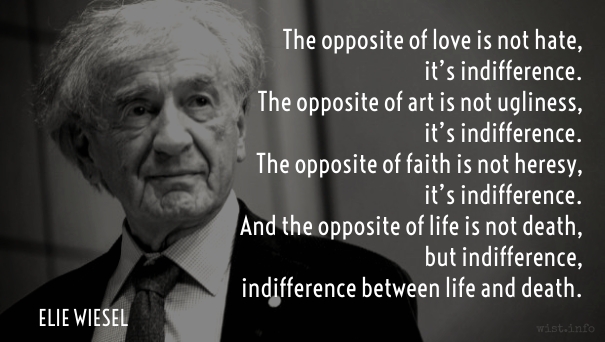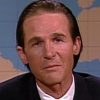He who don’t luv himself vents hiz spleen bi hating everyboddy else.
[He who doesn’t love himself vents his spleen by hating everybody else.]
Josh Billings (1818-1885) American humorist, aphorist [pseud. of Henry Wheeler Shaw]
Everybody’s Friend, Or; Josh Billing’s Encyclopedia and Proverbial Philosophy of Wit and Humor, “Variety,” “Bread and Butter” (1874)
(Source)
Quotations about:
hatred
Note not all quotations have been tagged, so Search may find additional quotes on this topic.
Like an unchecked cancer, hate corrodes the personality and eats away its vital unity. Hate destroys a man’s sense of values and his objectivity. It causes him to describe the beautiful as ugly and the ugly as beautiful, and to confuse the true with the false and the false with the true.
Martin Luther King, Jr. (1929-1968) American clergyman, civil rights leader, social activist, preacher
Strength to Love, ch. 5 “Loving Your Enemies,” sec. 2 (1963)
(Source)
John F. Kennedy was the victim of the hate that was a part of our country. It is a disease that occupies the minds of the few but brings danger to the many.
Men hate more steadily than they love; and if I have said something to hurt a man once, I shall not get the better of this by saying many things to please him.
Samuel Johnson (1709-1784) English writer, lexicographer, critic
In James Boswell, Life of Samuel Johnson, “September 15, 1777” (1791)
(Source)
Men often hate each other because they fear each other; they fear each other because they don’t know each other; they don’t know each other because they can not communicate; they can not communicate because they are separated.
Martin Luther King, Jr. (1929-1968) American clergyman, civil rights leader, social activist, preacher
Stride Toward Freedom, ch. 2 “Montgomery Before the Protest” (1958)
(Source)
Darkness cannot drive out darkness; only light can do that. Hate cannot drive out hate; only love can do that. Hate multiplies hate, violence multiplies violence, and toughness multiplies toughness in a descending spiral of destruction […] The chain reaction of evil — hate begetting hate, wars producing more wars — must be broken, or we shall be plunged into the dark abyss of annihilation.
Their mistakes are always due to lack of moderation and taking things too far, contrary to Chilon’s saying. That is, they do everything to excess: they love excessively, they hate excessively, and so on and so forth.
καὶ ἅπαντα ἐπὶ τὸ μᾶλλον καὶ σφοδρότερον ἁμαρτάνουσι, παρὰ τὸ Χιλώνειον (πάντα γὰρ ἄγαν πράττουσιν: φιλοῦσι γὰρ ἄγαν καὶ μισοῦσιν ἄγαν καὶ τἆλλα πάντα ὁμοίως), καὶ εἰδέναι ἅπαντα οἴονται καὶ διισχυρίζονται (τοῦτο γὰρ αἴτιόν ἐστιν καὶ τοῦ πάντα ἄγαν)
Aristotle (384-322 BC) Greek philosopher
Rhetoric [Ῥητορική; Ars Rhetorica], Book 2, ch. 12, sec. 14 (2.12.14) / 1389b (350 BC) [tr. Waterfield (2018)]
(Source)
Speaking of youth.
Chilon was one of "the Seven Wise Men" of Greece. His maxim was "Μηδὲν ἄγαν" ["Never go to extremes."] (Diogenes Laertius, Lives of Eminent Philosophers, 1.41)
(Source (Greek)). Alternate translations:
- "And all their errors are on the side of excess, and too much zeal, contrary to Chilo's rule; for they carry every thing too far. For they are extreme in their friendships, and in their hates, and in all other their actions are similarly excessive." [Source (1847)]
- "And all their errors are on the side of excess and too great earnestness, in contravention of Chilo's rule; for the young carry everything to an excess; for their friendships are in excess, their hatreds are in excess, and they do everything else with the same degree of earnestness." [tr. Buckley (1850)]
- "All their mistakes are on the side of excess or vehemence -- against the maxim of Chilon; they do everything too much; they loe to much, hate too much, and so in all else." [tr. Jebb (1873)]
- "All their mistakes are in the direction of doing things excessively and vehemently. They disobey Chilon's precept by overdoing everything, they love too much and hate too much, and the same thing with everything else." [tr. Roberts (1924)]
- "All their errors are due to excess and vehemence and their neglect of the maxim of Chilon, for they do everything to excess, love, hate, and everything else." [tr. Freese (1926)]
- "And quite all the mistakes they make tend in the direction of excess and vehemence, in violation of the saying of Chilon, for they do all things excessively: they feel friendly affection to excess and hatred to excess, and all else similarly." [tr. Bartlett (2019)]
You shall not hate in your heart anyone of your kin; you shall reprove your neighbor, or you will incur guilt yourself. You shall not take vengeance or bear a grudge against any of your people, but you shall love your neighbor as yourself: I am the Lord.
The Bible (The Old Testament) (14th - 2nd C BC) Judeo-Christian sacred scripture [Tanakh, Hebrew Bible], incl. the Apocrypha (Deuterocanonicals)
Leviticus 19:17-18 [NRSV (2021 ed.)]
(Source)
One of the components of the Greatest Commandments, as outlined by Christ; see Matthew 22:36-40. Alternate translations:
Thou shalt not hate thy brother in thine heart: thou shalt in any wise reason with thy neighbor, and not suffer sin upon him. Thou shalt not avenge, nor bear any grudge against the children of thy people, but thou shalt love thy neighbor as thyself: I am the Lord.
[KJV (1611)]
You must not bear hatred for your brother in your heart. You must openly tell him, your neighbor, of his offence; this way you will not take a sin upon yourself. You must not exact vengeance, nor must you bear a grudge against the children of your people. You must love your neighbor as yourself. I am Yahweh.
[JB (1966)]
Do not bear a grudge against others, but settle your differences with them, so that you will not commit a sin because of them. Do not take revenge on others or continue to hate them, but love your neighbors as you love yourself. I am the Lord.
[GNT (1976)]
You will not harbour hatred for your brother. You will reprove your fellow-countryman firmly and thus avoid burdening yourself with a sin. You will not exact vengeance on, or bear any sort of grudge against, the members of your race, but will love your neighbor as yourself. I am Yahweh.
[NJB (1985)]
You must not hate your fellow Israelite in your heart. Rebuke your fellow Israelite strongly, so you don’t become responsible for his sin. You must not take revenge nor hold a grudge against any of your people; instead, you must love your neighbor as yourself; I am the Lord.
[CEB (2011)]
You shall not hate your kinsfolk in your heart. Reprove your kin but incur no guilt on their account. You shall not take vengeance or bear a grudge against members of your people. Love your fellow [Israelite] as yourself: I am יהוה.
[RJPS (2023 ed.)]
The Americans are poor haters in international affairs because of their innate feeling of superiority over all foreigners. An American’s hatred for a fellow American (for Hoover or Roosevelt) is far more virulent than any antipathy he can work up against foreigners. […] Should Americans begin to hate foreigners wholeheartedly, it will be an indication that they have lost confidence in their own way of life.
Eric Hoffer (1902-1983) American writer, philosopher, longshoreman
True Believer: Thoughts on the Nature of Mass Movements, Part 3, ch. 14, § 73 (1951)
(Source)
Any sufficiently advanced prejudicial piety is indistinguishable from hatred.
Indifference, to me, is the epitome of evil.
The opposite of love is not hate, it’s indifference.
The opposite of art is not ugliness, it’s indifference.
The opposite of faith is not heresy, it’s indifference.
And the opposite of life is not death, but indifference,
indifference between life and death.Elie Wiesel (1928-2016) Romanian-American novelist, professor, political activist, Nobel Laureate.
“One Must Not Forget,” interview by Alvin P. Sanoff, US News & World Report (27 Oct 1986)
See also Nietzsche.
Though they seem at opposite poles, fanatics of all kinds are actually crowded together at one end. It is the fanatic and the moderate who are poles apart and never meet. The fanatics of various hues eye each other with suspicion and are ready to fly at each other’s throat. But they are neighbors and almost of one family. They hate each other with the hatred of brothers.
Eric Hoffer (1902-1983) American writer, philosopher, longshoreman
True Believer: Thoughts on the Nature of Mass Movements, Part 3, ch. 13, § 62 (1951)
(Source)
The ultimate weakness of violence is that it is a descending spiral, begetting the very thing it seeks to destroy. Instead of diminishing evil, it multiplies it. Through violence you may murder the liar, but you cannot murder the lie, nor establish the truth. Through violence you may murder the hater, but you do not murder hate. In fact, violence merely increases hate. So it goes. Returning violence for violence multiplies violence, adding deeper darkness to a night already devoid of stars. Darkness cannot drive out darkness; only light can do that. Hate cannot drive out hate: only love can do that.
Martin Luther King, Jr. (1929-1968) American clergyman, civil rights leader, social activist, preacher
Where Do We Go from Here: Chaos or Community? (1967)
(Source)
It is human nature to hate the man whom you have to hurt.
[Proprium humani ingenii est odisse quem laeseris.]
Tacitus (c.56-c.120) Roman historian, orator, politician [Publius or Gaius Cornelius Tacitus]
Agricola, ch. 42 (AD 98)
(Source)
Alt trans: "It belongs to human nature to hate those you have injured."
He that fears you present, will hate you absent.
Thomas Fuller (1654-1734) English physician, preacher, aphorist, writer
Gnomologia: Adages and Proverbs, #2101 (1732)
(Source)
Never regard something as doing you good if it makes you betray a trust, or lose your sense of shame, or makes you show hatred, suspicion, ill will, or hypocrisy, or a desire for things best done behind closed doors.
[Μὴ τιμήσῃς ποτὲ ὡς συμφέρον σεαυτοῦ, ὃ ἀναγκάσει σέ ποτε τὴν πίστιν παραβῆναι, τὴν αἰδῶ ἐγκαταλιπεῖν, μισῆσαί τινα, ὑποπτεῦσαι, καταράσασθαι, ὑποκρίνασθαι, ἐπιθυμῆσαί τινος τοίχων καὶ παραπετασμάτων δεομένου.]
Marcus Aurelius (AD 121-180) Roman emperor (161-180), Stoic philosopher
Meditations, Book 3, #7 [tr. Hays (2003)]
(Source)
Original Greek. Alternate translations:
Never esteem of anything as profitable, which shall ever constrain thee either to break thy faith, or to lose thy modesty; to hate any man, to suspect, to curse, to dissemble, to lust after anything, that requireth the secret of walls or veils.
[tr. Casaubon (1634), #8]
Don't be fond of any thing, or think that for your interest, which makes you break your word, quit your modesty, be of a dissembling, suspicious, or outrageous humor; which puts you up on hating any person, and inclines you to any practice, which won't bear the light, and look the world in the face.
[tr. Collier (1701)]
Never value anything as profitable to thyself which shall compel thee to break thy promise, to lose thy self-respect, to hate any man, to suspect, to curse, to act the hypocrite, to desire anything which needs walls and curtains.
[tr. Long (1862)]
Think nothing for your interest which makes you break your word, quit your modesty, hate, suspect, or curse any person, or inclines you to any practice which will not bear the light and look the world in the face.
[tr. Zimmern (1887)]
Never esteem anything as of advantage to thee that shall make thee break thy word or lose thy self-respect.
[tr. Morgan, in Bartlett's (1894)]
Never value as an advantage to yourself what will force you one day to break your word, to abandon self-respect, to hate, suspect, execrate another, to act a part, to covet anything that calls for walls or coverings to conceal it.
[tr. Farquharson (1944)]
Never value the advantages derived from anything involving breach of faith, loss of self-respect, hatred, suspicion, or execration of others, insincerity, or the desire for something which hast to be veiled and curtained.
[tr. Staniforth (1964)]
Never value as beneficial to yourself something that will force you one day to break your word, abandon your sense of shame, hate, suspect, or curse someone else, pretend, or desire something that needs the secrecy of walls or curtains.
[tr. Gill (2013)]
Value nothing which compels you to break your promise, to abandon your honor, to hate, suspect or curse anyone, to be a hypocrite, or to lust after anything which needs walls or decorations.
[tr. @sentantiq (2019)]
Some causes will force you to betray faith, abandon shame, hate or suspect another person, call down curses, put forward explanations, or desire something that requires walls and fences. Do not regard these causes as necessary or beneficial to yourself.
[Source]

















